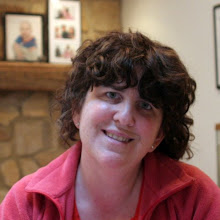Now, this is a survivor! I'd even go out on a limb and say she was cured. Unfortunately, in the world of breast cancer, you cannot be pronounced cured until you manage to die from something else. We have no cure. Just treatments. There is such a thing as "no evidence of disease," but unfortunately, that is not the same thing as a cure.
http://www.jacksonville.com/tu-online/stories/103108/met_350169631.shtml
Approaching her 101st birthday, she says it "is not a death sentence."
By SHAKAYA ANDRES, The Times-Union
Times were different - to say the least - when Ruth Mooneyhan got breast cancer more than six decades ago.
Surgery was performed only one way because doctors knew so little about the disease. It wasn't talked about openly, the way people do today. And after-care? When Mooneyhan couldn't afford a prosthesis after a radical mastectomy of her right breast, she took matters into her own hands.
She made her own.
"A lady at Sears Roebuck cut me out a pattern," said Mooneyhan, who grew up in Marianna but now lives at a nursing home on Jacksonville's Westside. "I put my own pockets in."
Mooneyhan is believed by the American Cancer Society to be one of the oldest - if not the oldest - breast cancer survivors in the U.S. At 100, she is inspiring family and friends who marvel at her resilience after being afflicted with a disease whose mortality rate in the 1940s was as high as 50 percent.
Ernest Mooneyhan was 15 when his mother was diagnosed with breast cancer in 1943. He still admires her ability to cope with breast cancer at the young age of 35.
"She's definitely been an inspiration to me," he said. "She didn't let anything get her down. She's very close to the Lord. She believes it's because of the Lord's mercy and grace that she's still living."
The memories of suffering from breast cancer are a bit foggy for Ruth Mooneyhan, but one thing is certain: They will never be completely forgotten.
"I didn't know what [breast cancer] was, but I knew it was serious in my own mind," she said.
Mooneyhan was married with five children, all under 18, when she felt a lump in her right breast. She remembers how painful it was when she rubbed down on the lump.
"It was just a sore. [It felt] like a boil," she said. After doctoring the lump with cold packs and other home remedies for about a week, she gave up and went to a physician. The news wasn't good: A biopsy revealed breast cancer.
"I was heartbroken when the doctor told me ... I was scared," she said. "I never thought I'd live to see my children grow up."
She sat on the porch crying and praying before the surgery, and then she got her answer.
"A thought dropped down in my heart saying 'you'll see him larger than he is today,' " she said of her 2-year-old son, who she was swinging. "I saw him get grown and another one, too. It was an answered prayer."
She wasn't the only one scared. Her family was, too. They didn't know anything about cancer or anyone to turn to for answers.
Ernest said he remembers vividly the anguish his family went through the day his mother was diagnosed with breast cancer.
"We were scared she had to have surgery," he said. "I think it would have been a real encouragement to her if she knew somebody [who could relate]."
Officials with the American Cancer Society's Florida division confirmed that tumor registries didn't begin until after World War II, and mass screenings for breast cancer weren't being done before then.
"Wow, I've never heard of someone [who has survived breast cancer for so many years]," said Lisa Braswell, a spokeswoman for the division.
In the early part of the 20th century, there was only one standard treatment for breast cancer, added Troy Guthrie, director of education and research at Baptist Cancer Institute. Radiation was in its beginning stages, and chemotherapy and hormonal therapy were non-existent.
"They have made enormous improvements in treatment and technology," said the 34-year oncologist. "[Doctors'] understanding of how to do the surgery then [was] not as nearly as good as today."
Death rates have significantly declined over the years - to 21.4 percent in Florida, according to the state Department of Health - with increased public awareness, improved breast cancer surgery and superior screenings.
For Mooneyhan, doctors in Marianna didn't have the equipment to perform a Halsted radical mastectomy - the disfiguring and debilitating standard surgery in the '40s in which the breast, chest muscles and all of the lymph nodes under the arm are removed.
She was referred to Jacksonville, where she stayed at her sister-in-law's house for a month after her surgery.
After the procedure, she went back for x-rays of her chest every month for years as a precaution to make sure the cancer didn't reappear.
Now, just months away from celebrating her 101st birthday, Mooneyhan said she is blessed to have lived a fulfilled life. She wants to encourage women with breast cancer to hold on to their faith.
"I just had faith and believed that the Lord would bring [me] through," she said. "[Breast cancer] is not a death sentence."
Subscribe to:
Post Comments (Atom)

No comments:
Post a Comment